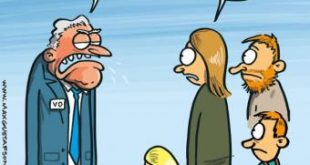I got you babe (personal) .[embedded content] As always for you, Jeanette Meyer.
Read More »Raising Keynes
The defeat and suppression of the classical perspective — with its evolutionary, institutionalist, and developmental descendants — cleared the way for a dogmatic economics that exalted self-regulating competitive markets … As we have seen, this perspective soon ran into serious — but temporary — difficulties with the Great Depression, mass unemployment, and the rise of Keynes, whose theory is revived in Harvard University economist Stephen A. Marglin’s Raising Keynes …...
Read More »Mainstream economics — the poverty of fictional story-telling
Mainstream economics — the poverty of fictional story-telling One of the limitations with economics is the restricted possibility to perform experiments, forcing it to mainly rely on observational studies for knowledge of real-world economies. But still — the idea of performing laboratory experiments holds a firm grip of our wish to discover (causal) relationships between economic ‘variables.’If we only could isolate and manipulate variables in controlled...
Read More »Lars Vilks (1946-2021) In Memoriam
Lars Vilks (1946-2021) In Memoriam Sad, sad, sad, news reached us yesterday, when this brave artist was reported to have died in a traffic accident. R.I.P.
Read More »Hilfe, mein Kind ist FDP-Wähler!
Hilfe, mein Kind ist FDP-Wähler! [embedded content]
Read More »Striden om friskolorna
Nu när debatten om vinster i välfärden åter har blommat upp verkar en del politiker och ledarskribenter vilja göra det hela till ett problem med “övervinster.” Men är det bara “övervinster” som är problemet med det unika svenska friskolesystemet? Varför skulle vinster som baseras enkom på skattemedel vara acceptabla så länge de inte är “övervinster”? Friskolekoncerner med många gånger undermålig verksamhet tillåts plocka ut skyhöga vinster. Många politiker tror att problemen...
Read More »Is gender a social construct?
Is gender a social construct? .[embedded content] Judith Butler’s theory of identity rests on the idea that there is nothing between the Scylla of the metaphysical ‘modernist’ subject and the Charybdis of the totally deconstructed identity where the subject becomes nothing but a fictitious fantasy. But this can’t be right. The social constructivist anti-essentialism is unsatisfactory and ends up in a idealist ‘slippery slope.’ Just shifting a biologically...
Read More »Serenity (personal)
.[embedded content] In loving memory of my parents-in-law, Ritva [† 2021] and Erik Syll [† 2020]
Read More »Postmodernist flips
I have argued against the postmodern tendency to flip from naive objectivism to relativism and idealism, from totalities to fragments, and from ethnocentrisms to new forms of self-contradictory cultural relativism. A realist approach shows us that we can escape from these alternatives. The Modernist project — and more specifically, critical social science — don’t need foundationalism or notions of absolute truth. They can be not only better understood but furthered through a...
Read More »Postmodern undecidability
For the idealist, the fact that the Inuit have many words for snow while the bush people of the Kalahari desert have none is merely a function of their different languages and has nothing to do with any extra-discursive reality … However, those who claim that reality is a discursive construct don’t believe what they say, for their practice — for example avoiding extra-discursive dangers, such as oncoming cars — shows that they cannot make the world a slave to their discourses...
Read More » Lars P. Syll
Lars P. Syll




